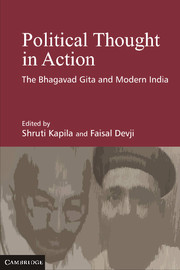Book contents
- Frontmatter
- Contents
- List of Contributors
- Acknowledgements
- Introduction
- 1 India, the Bhagavad Gita and the World
- 2 The Transnational Gita
- 3 The Transfiguration of Duty in Aurobindo's Essays on the Gita
- 4 Gandhi's Gita and Politics as Such
- 5 Gandhi on Democracy, Politics and the Ethics of Everyday Life
- 6 Morality in the Shadow of Politics
- 7 Ambedkar's Inheritances
- 8 Rethinking Knowledge with Action: V. D. Savarkar, the Bhagavad Gita and Histories of Warfare
- 9 A History of Violence
- Index
4 - Gandhi's Gita and Politics as Such
Published online by Cambridge University Press: 05 January 2014
- Frontmatter
- Contents
- List of Contributors
- Acknowledgements
- Introduction
- 1 India, the Bhagavad Gita and the World
- 2 The Transnational Gita
- 3 The Transfiguration of Duty in Aurobindo's Essays on the Gita
- 4 Gandhi's Gita and Politics as Such
- 5 Gandhi on Democracy, Politics and the Ethics of Everyday Life
- 6 Morality in the Shadow of Politics
- 7 Ambedkar's Inheritances
- 8 Rethinking Knowledge with Action: V. D. Savarkar, the Bhagavad Gita and Histories of Warfare
- 9 A History of Violence
- Index
Summary
Immediately after the Amritsar Congress of December 1919, Gandhi joined issue with the Indian nationalist leader Balagangadhar Tilak, or Tilak Maharaj, or the Lokamanya (as he was popularly called), on the question of the nature of modern politics. He cited Tilak as someone whose understanding of politics was opposed to his:
Lokamanya Tilak represents a definite school of thought of which he makes no secret. He considers that everything is fair in politics. We have joined issue with him in that conception of political life. We consider that political life of the country will become thoroughly corrupt if we import Western tactics and methods.
Opposing the idea that it could be “proper” for leaders of political parties “to use others as tools so long as there are any to be used,” Gandhi recommended that the “right course” would lie in taking care to “purify our politics.”
Tilak disagreed with Gandhi's understanding of his—Tilak's—conception of political action. “[Y] ou have represented me as holding that … everything [was] fair in politics. I write … to say that my view is not correctly represented herein. Politics is a game of worldly people and not of Sadhus [renouncers; holy men].” A “sadhu,” Tilak suggested, using a supposedly Budhhist maxim, was someone who sought to conquer anger. “I prefer,” he said, “to rely on the maxim of [the god] Shri Krishna,” who tailored his responses to particular devotees by keeping them “in perfect harmony with the manner of their own approach.” “Any further explanation of the difference,” said Tilak in conclusion, “will be found in my Gita-Rahasya.”
- Type
- Chapter
- Information
- Political Thought in ActionThe Bhagavad Gita and Modern India, pp. 66 - 87Publisher: Cambridge University PressPrint publication year: 2013
- 1
- Cited by



